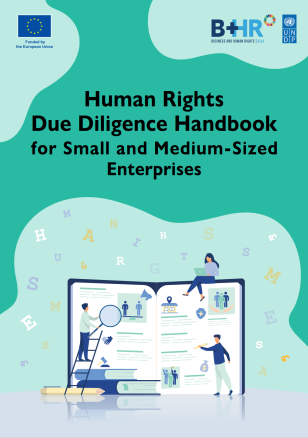Human Rights Due Diligence Handbook for Small and Medium-Sized Enterprises
Human Rights Due Diligence Handbook for Small and Medium-Sized Enterprises
March 14, 2024
The United Nations Development Programme (UNDP) Thailand, with support from the European Union, developed the Human Rights Due Diligence Handbook for Small and Medium-Sized Enterprises (“the Handbook”) to strengthen business understanding of the linkages between operations and human rights. Tailored specifically for small and medium-sized enterprises (SMEs), the Handbook aims to build their capacity to implement human rights due diligence (HRDD) and integrate relevant human rights principles into their practices.
Human rights due diligence is a vital process to ensure that businesses respect and uphold human rights throughout their operations. It forms a key component of responsible corporate conduct, supporting broader efforts to advance human rights, democracy, and the rule of law—cornerstones for achieving sustainable development.
To support this objective, the Handbook offers a comprehensive overview of business and human rights, the UN Guiding Principles on Business and Human Rights (UNGPs), and practical implementation guidance. It includes clear procedures, illustrative case studies, and actionable recommendations, all crafted to help SMEs enhance their understanding and readiness to conduct HRDD within their own organizations and supply chains. The content aligns with internationally recognized standards and is presented in accessible language to engage a wide range of readers.
Building on this foundation, in 2025 UNDP, in collaboration with the Rights and Liberties Protection Department (RLPD) of the Ministry of Justice, the National Human Rights Commission of Thailand, the SME Development Bank, and the Governor of Phuket, launched an updated version of the Handbook. This edition introduces a new annex—Annex E—featuring a human rights risk assessment checklist designed specifically for SMEs. This tool supports businesses in identifying potential human rights risks within their operations and serves as an educational resource to increase awareness across teams.
The checklist, now a core component of the Human Rights Due Diligence Manual for SMEs, is structured around different stakeholder groups and types of incidents that may pose significant risks. It helps businesses map out potential challenges and plan meaningful stakeholder engagement—an essential step in mitigating adverse human rights impacts.
Through these efforts, UNDP reaffirms its commitment to supporting the Thai government and private sector in transforming the Protect, Respect, Remedy framework under the UNGPs into meaningful action on the ground.

 Locations
Locations





